Amadeus
Amadeus is the title of both a stage play and a film written in 1979 by Peter Shaffer, both loosely based on the lives of the composers Wolfgang Amadeus Mozart and Antonio Salieri. more...
Amadeus was inspired by Mozart and Salieri, a short play by Aleksandr Pushkin (later adapted into an opera by Nikolay Rimsky-Korsakov).
The title refers to a name that Mozart often used (he was baptized as Johannes Chrysostomus Wolfgangus Theophilus Mozart) as a pen name. It is a Latinization of the Greek Theophilus, which Mozart sometimes also Germanized as "Gottlieb." All three names mean "God-lover" or "Loved by God" and, aside from being a direct reference to Mozart, the title serves as an ironic reference to Salieri's relationship with God in the play and film (see the plot section, below, for more detail).
Shaffer uses English to stand in for German throughout the play and film. That is, whenever the characters are speaking in English, the audience is to understand that they are speaking vernacular German. Indeed, even operas with libretti in German, such as Die Entführung aus dem Serail (The Abduction from the Seraglio) and Die Zauberflöte (The Magic Flute) are translated into English, so as to maintain this concept. Italian opera lyrics, on the other hand, are sung in the original to preserve their "foreign-ness" within the story.
The play, and to a much larger extent the film, make use of Mozart's music (as well as that of a few other composers, including Salieri). The film famously opens with the powerful "Allegro con brio" from Mozart's Symphony No. 25 in G Minor, and closes with Mozart's inimitable Requiem. The film's score was performed by The Academy of St. Martin-in-the-Fields, conducted by Sir Neville Marriner.
Plot
There are some important differences between the screenplay and the stage play, notably the number and treatment of scenes without Salieri in them, the portrayal of Emperor Joseph II, Emanuel Schikaneder, and Baron van Swieten, Mozart's relationship with the Masons, and the finale.
Shared plot
Amadeus the theatrical production tells Mozart's story from the point of view of the court composer Antonio Salieri, who is presented as a caricature of jealous mediocrity. Salieri speaks directly to the audience at many times during the play, his soliloquies serving to move the timeline forward and back, and to narrate the goings on. In the film, Shaffer employs an interlocutor (a young priest) for Salieri to achieve this same function, but the film is told from a more neutral, third-person perspective and there are more scenes without Salieri in them (especially in the Director's Cut). Most of the film, and much of the play, are presented in retrospective.
At the opening of the tale, Salieri has not met Mozart in person, but has heard of him and his music. He adores Mozart's compositions, and is thrilled at the chance to meet Mozart in person, during a salon at which both of their compositions will be played. When he finally does catch sight of Mozart, however, he is deeply disappointed to find that Mozart's personality does not match the grace or charm of his compositions: Mozart is crawling around on his hands and knees, engaging in an immature dialogue with Constanze Weber (who would later become his wife). As Mozart himself later explains: "I am a vulgar man. But... my music is not."
Read more at Wikipedia.org



